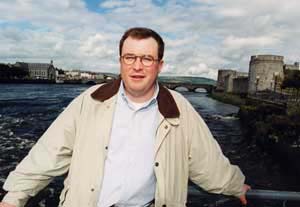|
Ceol Agus Craic of Another Kind
By Tom Crann
Hillocks dotted with sheep. Craggy sea cliffs. Lone thatch-roofed houses. The scenery in the West of Ireland is a feast for the eyes. Enter one of the region's small towns, however, and you're just as likely to discover a feast for the ears. Though it might not be what you'd expect. You're bound to come upon a pub promising "ceol agus craic," music and a good time. Flutist James Galway once said: "It is next to impossible to toss a brick into the air in County Galway without it landing on the head of some musician." While he was likely referring to players of Irish folk or traditional music ("trad"), more and more today he could mean a string quartet or a choir, too. Irish composers are lucky that daily life in Ireland contains a wealth of music. It pours out of warm pubs in Galway. Buskers line Dublin's busy Grafton Street. If you dash into St. Teresa's parish for mass, you'll be amazed at the heavenly sounds of the choir. Equally impressive is the music in the Cathedrals of St. Patrick and Christ Church—a stone's throw from where Handel's Messiah first resonated through the Musick Hall in Fishamble Street. There's also the sheer pleasure of hearing English in the virtuoso mouths of the Irish. Has any culture used the English language more musically, in poetry, on stage? Does anyone sprinkle workday conversation with more wit? When I interviewed James Galway recently, he told me he listens to Ireland's classical radio station Lyric FM online from wherever he might be. He said it's about time the classics were introduced by Irish voices. It seems to me that Irish composers have taken inspiration from all these sounds "in the air." But do those inspirations turn into something sounding explicitly Irish? Certainly those elements come to the fore in the work of Harty and Stanford. But others have eschewed the "didd-lee-aye" for a more stringent international sound. Not every American composer writes music like Copland or Virgil Thomson, either. The history of classical music in Ireland is a determined one: amidst the suffering of 1848—the height of the famine years—Dublin's Royal Irish Academy of Music was founded. It's still a prominent teaching institution, having marked its sesquicentennial in 1998. That same year, the National Symphony of Ireland celebrated its 50th anniversary. It has served as a bridge to a wider European culture, presenting soloists and composers from the continent, and it has done much to bolster Irish music, too. It performs a full symphonic season in the National Concert Hall in Dublin. Likewise, Belfast's excellent Ulster Orchestra delights Northern Irish audiences in its brand new Waterfront Hall, on the banks of the River Lagan The Irish Chamber Orchestra plays old favorites and new commissions from Ireland's brightest young composers. Their performances pack St. Flannan's—a 13th-century cathedral in the hills of County Clare—each summer for the Killaloe Festival. (This summer, the Saint Paul Chamber Orchestra's Nicholas McGegan will be conducting at the festival.) The West Cork Chamber Music Festival takes place in a stately Georgian manor on Bantry Bay. The ivy-covered manse looks out to the sea. It has attracted chamber music lovers from just about everywhere. At Easter week this past year, when Russia's acclaimed Borodin Quartet was in residence, I enjoyed a concert of Shostakovich seated next to a couple from Columbus, Ohio! "The best modern music is the fruit of a complex culture which no Irishman can enjoy today in his own country. Ireland has not reached the Wagnerian stage yet. I've been there; and I know." George Bernard Shaw, writing 111 years ago, about the musical culture of his native country. With all due respect to ol' GBS, I'm afraid there's not much truth left to his observation. I've been there more recently, and I know. |
MPR Home | News | Music Collection | Events | Radio Listening | Your Voice | About Us | Support Us | Help ©2005 Minnesota Public Radio | Terms of Use | Privacy Policy |

